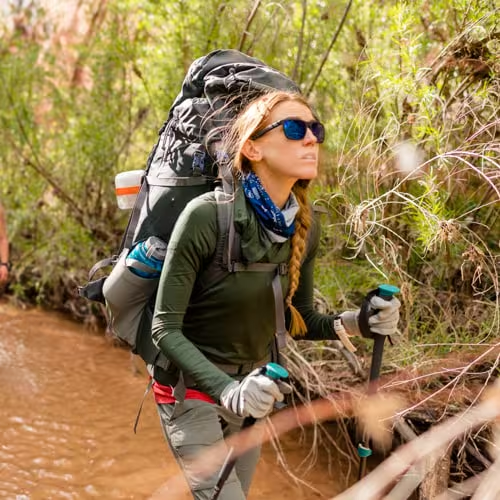Why We Like The Petzl Push Rope
When rappelling below the surface, we do so with Petzl's Push Rope. The mid-fat diameter saves grams in our pack yet still delivers burly performance against rock. The EverFlex treatment improves suppleness to give us greater grip and knotability, while the slight static elongation boosts safety and comfort when accidentally shock loaded.
Details
- Semi-static rope for exploring caves and canyons
- 9mm diameter balances weight and durability
- EverFlex treatment for improved grip and consistent handling
- Middle mark helps you to easily and quickly identify center
- Item #PTZ003T
- Type
- semi-static
- Diameter
- 9mm
- Static Elongation
- 3.7%
- Impact Force
- 4.3kN
- Breaking Strength
- 20kN, [with figure 8] 12kN
- UIAA Falls
- 5
- Center Mark
- yes
- Sheath Construction
- 32 carrier
- Sheath Mass
- 46%
- Rope Weight
- 55g/m
- Claimed Weight
- [40m] 4lb 13.6oz, [60m] 7lb 4.4oz, [70m] 8lb 7.8oz, [200m] 24lb 4oz
- Manufacturer Warranty
- limited 3 year
- Activity
- canyoneering
Reviews
Q&A
What do you think about this product?
View
Selecting an option will reload the available reviews on the pageSorry, we don’t currently have any of those types of reviews for this product.
Do you have a question about this product?
Related Searches
Petzl Push Rope for rappelling9mm semi-static rope for canyoneeringLightweight rope with EverFlex treatmentDurable climbing rope for cave explorationPetzl rope with middle mark for easy identificationStatic elongation of 3.7% for added safetyHigh breaking strength of 20kN for reliabilityImpact force rating of 4.3kN for secure descentsRope weight of 55g/m for efficient packingIdeal rope for both beginners and experienced climbersLimited 3-year warranty on Petzl Push RopePerfect for outdoor adventures in rugged terrainLearn more about Push Rope - 9mm
.jpg)



